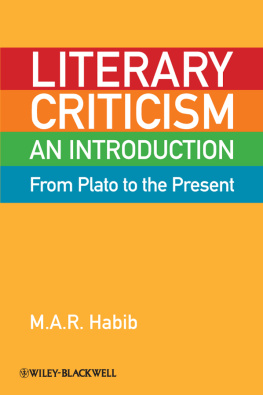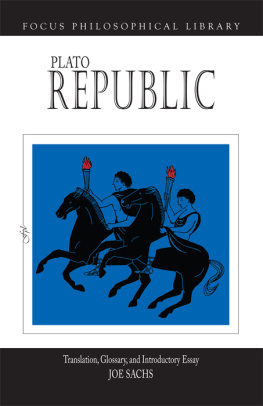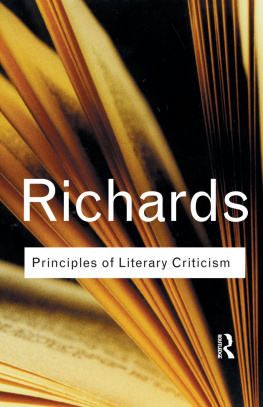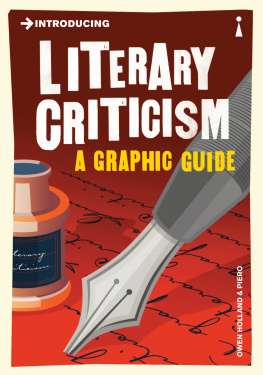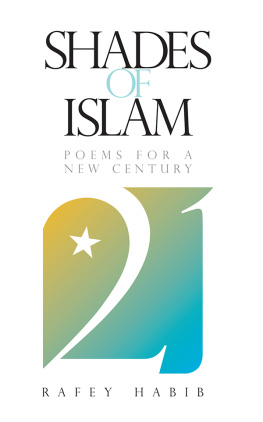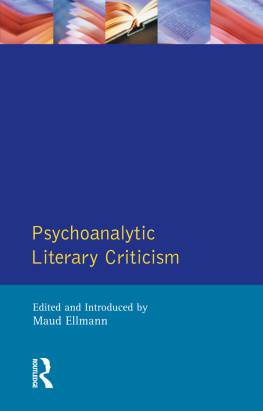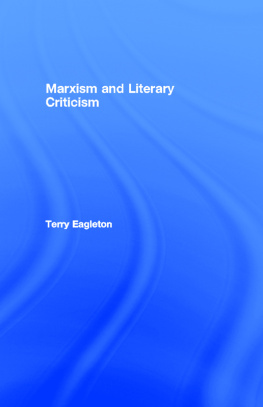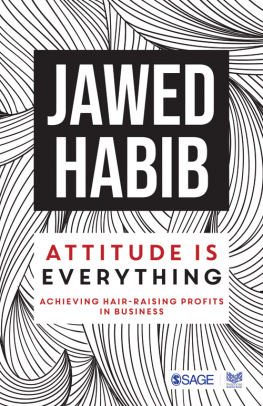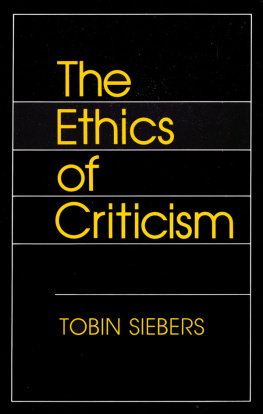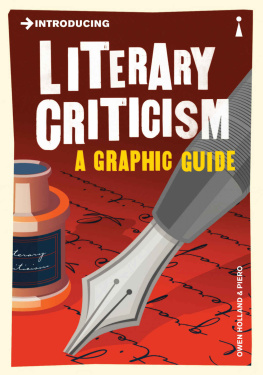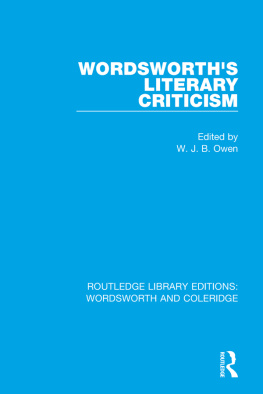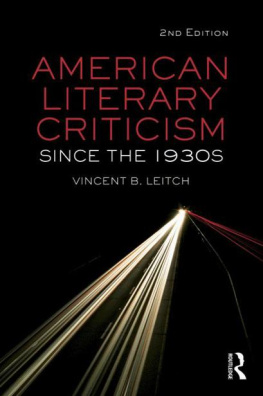M. A. R. Habib - Literary Criticism from Plato to the Present
Here you can read online M. A. R. Habib - Literary Criticism from Plato to the Present full text of the book (entire story) in english for free. Download pdf and epub, get meaning, cover and reviews about this ebook. year: 2011, publisher: Wiley, genre: Science. Description of the work, (preface) as well as reviews are available. Best literature library LitArk.com created for fans of good reading and offers a wide selection of genres:
Romance novel
Science fiction
Adventure
Detective
Science
History
Home and family
Prose
Art
Politics
Computer
Non-fiction
Religion
Business
Children
Humor
Choose a favorite category and find really read worthwhile books. Enjoy immersion in the world of imagination, feel the emotions of the characters or learn something new for yourself, make an fascinating discovery.
- Book:Literary Criticism from Plato to the Present
- Author:
- Publisher:Wiley
- Genre:
- Year:2011
- Rating:4 / 5
- Favourites:Add to favourites
- Your mark:
- 80
- 1
- 2
- 3
- 4
- 5
Literary Criticism from Plato to the Present: summary, description and annotation
We offer to read an annotation, description, summary or preface (depends on what the author of the book "Literary Criticism from Plato to the Present" wrote himself). If you haven't found the necessary information about the book — write in the comments, we will try to find it.
Literary Criticism from Plato to the Present — read online for free the complete book (whole text) full work
Below is the text of the book, divided by pages. System saving the place of the last page read, allows you to conveniently read the book "Literary Criticism from Plato to the Present" online for free, without having to search again every time where you left off. Put a bookmark, and you can go to the page where you finished reading at any time.
Font size:
Interval:
Bookmark:

Also available:
The Blackwell Guide to Literary Theory
Gregory Castle
Literary Theory: An Introduction, 25th Anniversary Edition
Terry Eagleton
A History of Literary Criticism: From Plato to the Present
M. A. R. Habib
Modern Literary Criticism and Theory: A History
M. A. R. Habib
Literary Theory: An Anthology, Second Edition
Edited by Julie Rivkin and Michael Ryan
Literary Theory: A Practical Introduction, Second Edition
Edited by Michael Ryan
The Encyclopedia of Literary and Cultural Theory
Edited Michael Ryan, Gregory Castle, Robert Eaglestone and
M. Keith Booker
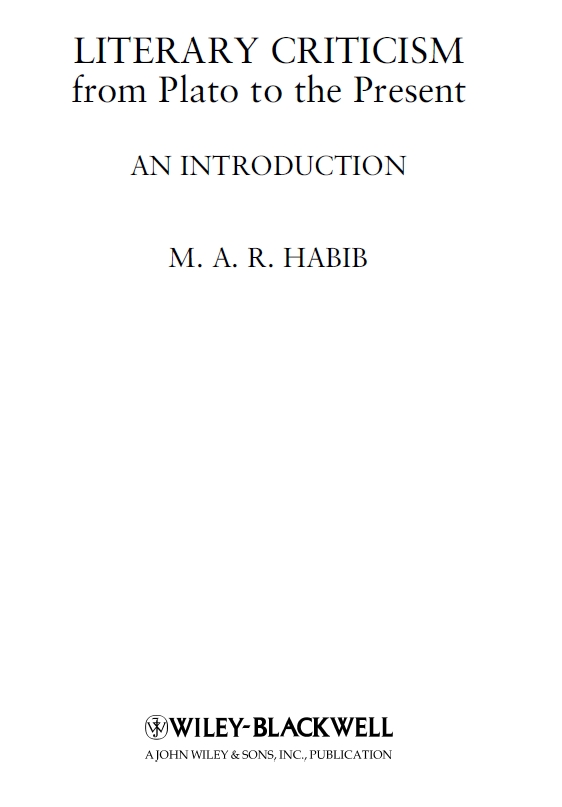
This edition first published 2011
2011 M. A. R. Habib
Blackwell Publishing was acquired by John Wiley & Sons in February 2007. Blackwells publishing program has been merged with Wileys global Scientific, Technical, and Medical business to form Wiley-Blackwell.
Registered Office
John Wiley & Sons Ltd, The Atrium, Southern Gate, Chichester, West Sussex, PO19 8SQ, United Kingdom
Editorial Offices
350 Main Street, Malden, MA 02148-5020, USA
9600 Garsington Road, Oxford, OX4 2DQ, UK
The Atrium, Southern Gate, Chichester, West Sussex, PO19 8SQ, UK
For details of our global editorial offices, for customer services, and for information about how to apply for permission to reuse the copyright material in this book please see our website at www.wiley.com/wiley-blackwell.
The right of M. A. R. Habib to be identified as the author of this work has been asserted in accordance with the UK Copyright, Designs, and Patents Act 1988.
All rights reserved. No part of this publication may be reproduced, stored in a retrieval system, or transmitted, in any form or by any means, electronic, mechanical, photocopying, recording, or otherwise, except as permitted by the UK Copyright, Designs, and Patents Act 1988, without the prior permission of the publisher.
Wiley also publishes its books in a variety of electronic formats. Some content that appears in print may not be available in electronic books.
Designations used by companies to distinguish their products are often claimed as trademarks. All brand names and product names used in this book are trade names, service marks, trademarks or registered trademarks of their respective owners. The publisher is not associated with any product or vendor mentioned in this book. This publication is designed to provide accurate and authoritative information in regard to the subject matter covered. It is sold on the understanding that the publisher is not engaged in rendering professional services. If professional advice or other expert assistance is required, the services of a competent professional should be sought.
Library of Congress Cataloging-in-Publication Data
Habib, Rafey.
Literary criticism from Plato to the present: an introduction/M.A.R. Habib.
p. cm.
Revised ed. of: A history of literary criticism: from Plato to the present. Malden, Mass.: Blackwell Pub., 2005.
Includes bibliographical references and index.
ISBN 978-1-4051-6034-6 (hardcover: alk. paper) ISBN 978-1-4051-6035-3 (pbk.: alk. paper)
1. CriticismHistory. I. Habib, Rafey. History of literary criticism. II. Title.
PN86.H23 2011
801.9509dc22
2010021915
For Mughni Tabassum
Acknowledgments
I would like to thank the following people for their encouragement, inspiration, and support or endorsement: Michael Payne, John Carey, Mughni Tabassum, Joe Barbarese, Robert Grant, Ron Bush, Peter Widdowson, Frank Kermode, Emma Bennett, and Yasmeen.
Introduction
Our English word criticism comes from the ancient Greek noun krites, meaning judge. But what does it mean to be a judge of literature? We might break this down into several basic questions: what is the purpose of literary criticism? How broad is this field of inquiry, and who gets to define it? What are its connections with other disciplines such as philosophy and religion? How does it relate to the realms of morality, of knowledge, and of learning? Does it have any political implications? How does it impinge on our practices of reading and writing? Above all, what significance does it have, or could it possibly have, in our own lives? Why should we even bother to study literary criticism? Is it not enough for us to read the great works of literature, of poetry, fiction, and drama? Why should we trouble ourselves to read what people say about literature? And surely, after all the obscure theory of the last 50 years or so, what we need to get back to is the texts themselves. We need to appreciate literature for its beauty and its technical artistry. In short, we need to read literature as literature without the interference of some judge telling us what to look for or how to read.
How can we answer such skepticism? We might begin by recalling that theory and critical reflection on literature began at least 2500 years ago, and have been conducted by some of the greatest Western thinkers and writers, ranging from Plato and Aristotle, through Augustine and St Thomas Aquinas, Johnson, Pope, and the great Romantics to the great modern figures such as Locke, Hume, Kant, Hegel, Freud, W. B. Yeats, and Sartre. Until 200 years ago, most great thinkers, critics, and literary artists would not have understood what was meant by reading literature as literature. They knew that literature had integral connections with philosophy, religion, politics, and morality; they knew, in other words, that literature was richly related to all aspects of peoples lives.
If we had no tradition of critical interpretation, if we were left with the texts themselves, we would be completely bewildered. We would not know how to classify a given writer as Romantic, classical, or modern. We would not know that a given poem was epic or lyric, mock-heroic, or even that it was a poem. We would be largely unaware of which tradition a given writer was working in and how she was trying to subvert it in certain ways. We would not be able to arrive at any comparative assessment of writers in terms of literary merit. We would not even be able to interpret the meanings of individual lines or words in any appropriate context. It has been the long tradition of literary interpretation refined and evolved over many centuries which has addressed these questions. It is surely naive to think that we are all endowed with some superior sensibility which can automatically discern which writers are great and which are mediocre. We do not even know for certain how the ancient Greek of Homer was pronounced; most of us cannot read the Greek of Plato or the Latin of Aquinas or the Italian of Dante or the Arabic of al-Ghazzali. How would we ever, independently, arrive at any estimation of these writers or their backgrounds or their contributions without a body of critical apparatus, without a tradition of critical expertise and interpretation, to help us? Shakespeare is a great writer because that has been the enduring consensus of influential critics. The reputations of writers can vary quite dramatically. At the beginning of the twentieth century, T. S. Eliot was a powerful critical voice, denigrating the Romantics, extolling the metaphysical poets and revaluating the very idea of tradition. Nowadays, Eliot commands far less critical authority, though his high status as a poet endures.
Font size:
Interval:
Bookmark:
Similar books «Literary Criticism from Plato to the Present»
Look at similar books to Literary Criticism from Plato to the Present. We have selected literature similar in name and meaning in the hope of providing readers with more options to find new, interesting, not yet read works.
Discussion, reviews of the book Literary Criticism from Plato to the Present and just readers' own opinions. Leave your comments, write what you think about the work, its meaning or the main characters. Specify what exactly you liked and what you didn't like, and why you think so.

